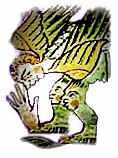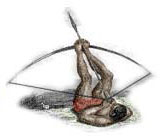Ashmedai
(Heb. Asmodeus) is the name of an evil spirit. The
name Asmodeus seems to be derived from the Persian aesma daeva, the
Zoroastrian "spirit of anger." He is
first mentioned in Apocryphal Book of Tobit as the king of the demons
who falls in love with Sarah, daughter of Raguel, and slays all those who
wished to marry her. Finally, Tobit, instructed by the angel Raphael (Ashmedai's
chief antagonist) renders him harmless and married Sarah.
A long account of Ashmedai appears in the Talmud [1], relating how King
Solomon succeeded in capturing him and forcing him into service for the
building of the Temple. Later aggadic legend depicts him as a merry trickster
rather than an evil demon, while according to some sources his influence
is actually beneficent and is directed to guarding the moral order of the
universe.
The following is one of the many tales involving Ashmedai. Here Ashmedai
and King Solomon change places. |
For many years after the Temple was completed,
Solomon kept the demon Ashmedai prisoner in his dungeon. One day Solomon said
to him, " How can you call yourself King of Demons if I, a mere man of flesh
and blood, can hold you captive?"
 "Release
me from my chains and give me your magic ring," answered Ashmedai. "Then we
shall see who is king." "Release
me from my chains and give me your magic ring," answered Ashmedai. "Then we
shall see who is king."
Confident of his own power, Solomon granted Ashmedai's wish. Instantly the demon
seized the king's crown, and with a single flick of his powerful wing, hurled
Solomon four hundred miles from Jerusalem.
Ashmedai then flung Solomon's magic ring into the sea, where it was swallowed
by a fish. For Ashmedai thought, "If anyone should gain possession of the ring,
he will know what I have done."
Then the Demon King disguised himself as Solomon and sat down upon his golden
throne.
When Solomon fell to earth, he found himself in an abandoned field. Bewildered,
he looked down into a pool of rainwater and behold! His royal robes had turned
to rags, his face was now covered with a dirty beard, and the thin furrow that
had once ringed his brow — the mark of Israel's kings — was gone.
Sadly, Solomon cut a wooden staff for himself and began to wander the countryside
as a beggar, crying, "I am Solomon! Once I was King of Israel! Now I rule only
the dust!"
 People
thought him mad. Children ran after him, laughing and throwing stones. People
thought him mad. Children ran after him, laughing and throwing stones.
Back in Jerusalem, Ashmedai managed to convince the entire court that he was
the real king. He made sure never to show the royal servants his feet, lest
they discover that they were like a rooster's. And he refused to see Benaiah
or Solomon's wives, for they knew the real king too well.
For three years Ashmedai reigned in Solomon's place, while the poor beggar-king
wandered in foreign lands. Solomon in his wisdom soon realized the God was making
him atone one year for each of his three sins: taking too many wives, too many
horses, and too much silver and gold.
At the end of three years, Solomon came to the foreign capital of Ammon. A servant
of the Ammonite king came to the market where Solomon was begging and hired
him as a cook.
One day Solomon asked the master cook if he might prepare a meal for the king.
Recalling the dishes from his own royal table, Solomon prepared a feast unlike
any ever seen before in the land of the Ammonites. The king immediately elevated
Solomon to chief cook.
The king of the Ammonites had an only daughter, Na'amah, a beautiful and kind-hearted
girl. Na'amah fell in love with her father's cook, for he was a handsome man
despite his coarse clothes. When her father learned of her wish to marry his
poor cook, he became furious.
 "Are
there no worthy princes in my kingdom that you must settle for one of my servants?" "Are
there no worthy princes in my kingdom that you must settle for one of my servants?"
But Na'amah would not change her mind. At first the king desired to kill them
both. But then he took pity on Na'amah, his only daughter, and sent them off
together to die in the wilderness.
"Let me not see their love or their death," he said.
Solomon tried to persuade Na'amah to return to her father's palace, but she
would not leave him, for she loved him dearly. After many days they came to
the seashore and there bought a fish to satisfy their great hunger. When Na'amah
cut open the fish, she found in its belly Solomon's magic ring with God's Holy
Name engraved upon it.
Solomon placed the gold ring upon his finger. Instantly his rags turned into
purple velvet cloth, his face began to shine, and a thin line creased his smooth
brow. Then Solomon told the astonished princess who he was and all that had
happened to him. He vowed to make her his queen and to make her firstborn son
king after him.
They then made their way to Jerusalem. At first the king's ministers only laughed
at Solomon's claim that he was the true king. But when he showed them his magic
ring and the furrow of a crown on his forehead, they all believed him. Then
they realized that for three years no one in the palace had ever seen the king's
feet.
Then Solomon strode fearlessly into the palace where Ashmedai sat upon his golden
throne.
"Remove your shoes, impostor!" demanded Solomon.
As soon as he saw the real king, Ashmedai let out
a fierce howl and jumped out of his shoes, revealing the horny yellow claws
of a chicken. Then he unfurled his great black wings, which had been hidden
so long under his robe, and spread them wide so that one touched heaven and
the other hell. And then, still shrieking, he flew away to his dark and lonely
mountain, never to be seen again.
Then Solomon ordered a great wedding feast and invited all the kings and queens
from near and far. How great was the joy of the King of Ammon when he recognized
his daughter and his cook whom he had given up for dead!
As he had promised, Solomon made his new wife Queen of Israel. And a year later
she gave birth to a son, whom they named Rehoboam. And in time Rehoboam became
king after Solomon.
|
From:
The Classic Tales, 4,000 Years of Jewish Lore. Ellen Frankel ed.,
Jason Aronson, 1989. |
|
[1] BT Gittin 68a-b |
|
 I
Kings 14:21; II Chronicles 12:13; Ecclesiastes 1:12; B. Gitten 68a-b; Midrash
Tehillim 78:351-353; Midrash Al-Yithallel (Sefer ah-Likkutim
I, 20-22, ed. Gruenhut); Midrash Sir HaShirim 29a-30a; B.Berakhot 6a; Zohar
III, 309a; Emek ha-Melekh, 12. English language sources: Louis Ginzberg,
Legends of the Jews IV, 169-172; Ben Gurion I, 141-146. I
Kings 14:21; II Chronicles 12:13; Ecclesiastes 1:12; B. Gitten 68a-b; Midrash
Tehillim 78:351-353; Midrash Al-Yithallel (Sefer ah-Likkutim
I, 20-22, ed. Gruenhut); Midrash Sir HaShirim 29a-30a; B.Berakhot 6a; Zohar
III, 309a; Emek ha-Melekh, 12. English language sources: Louis Ginzberg,
Legends of the Jews IV, 169-172; Ben Gurion I, 141-146. |
|